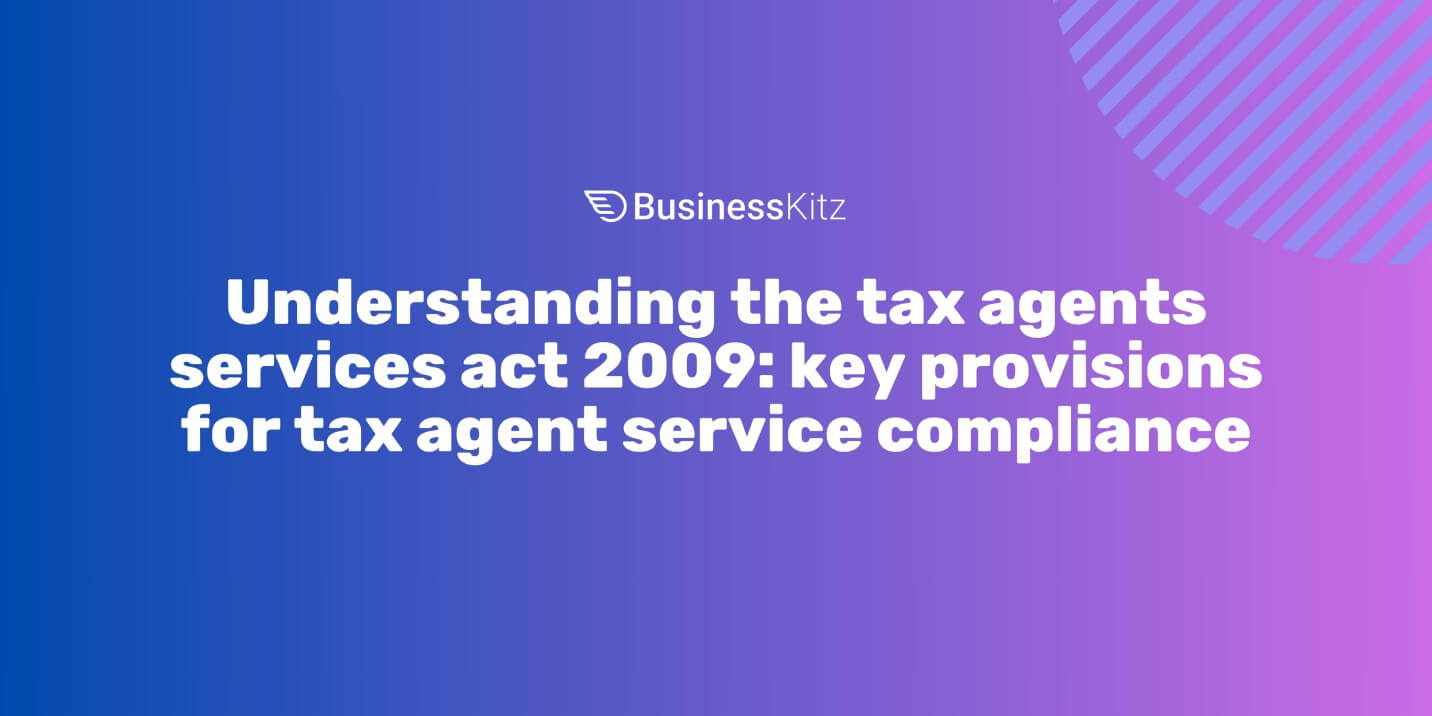
We've helped businesses save $55m with our all-in-one platform. Get instant access to this template and 115+ others, plus AI-powered document creation, starting completely free.
Tax Agent Services Act 2009 sets clear rules for tax professionals in Australia. It ensures tax agents, BAS agents, and financial advisers follow strict standards to protect clients and maintain trust. By regulating these services, the Act promotes transparency, fairness, and compliance. It also helps individuals and businesses access reliable and professional tax assistance.
The Tax Agent Services Act 2009 is a key part of Australia’s tax system. It ensures tax agents, BAS agents, and financial advisers meet professional standards and follow clear rules. The Act protects clients, promotes trust, and helps regulate tax-related services across the industry.[ez-toc]
The Tax Agent Services Act 2009 is a foundational element of Australia’s tax framework. It establishes strict standards for tax agents, BAS agents, and financial advisers, ensuring they operate professionally and ethically. The Act protects clients, fosters trust, and standardises tax-related services across the industry.

The Act was introduced to ensure consistency in tax professionals' operations. It sets guidelines that standardise practices and ensure compliance with Australian taxation laws.Key elements of the Act:
These provisions build public confidence by ensuring high-quality, compliant tax services.
The Act affects both professionals and clients involved in tax services.Professionals include:
Clients impacted:
A tax agent service involves professional help with tax matters. The Tax Agent Services Act 2009 defines these services clearly to ensure quality and compliance.
Tax agent services cover tasks related to taxes, financial records, and dealings with the Australian Taxation Office (ATO). These services include:
These services apply to individuals, businesses, and other entities seeking professional tax help.
Registration is a legal requirement for professionals offering tax agent services. It ensures that tax agents meet strict standards and deliver reliable client services. Registration plays a vital role in maintaining trust and compliance in the tax system.Key benefits include:
Clients can verify an agent’s registration by checking the Tax Practitioners Board's online register. Choosing a registered tax agent ensures professional advice and compliance with Australian taxation laws.
The Tax Agent Services Act 2009 safeguards clients by enforcing high standards for tax professionals. It promotes trust and ensures clients receive reliable, high-quality services.
The Act includes measures to shield clients from poor advice or unethical conduct.Key protections:
These measures reduce risks for clients and hold agents accountable for their work.
The Act offers tangible benefits that give clients confidence in their choice of tax agent.Key benefits:

The Tax Agent Services Act 2009 includes rules to promote transparency and compliance. These rules help build trust between tax agents and their clients while ensuring high standards of practice.
Transparency is key to maintaining trust. The Act requires tax agents to follow clear practices when dealing with clients.Key transparency measures include:
The Act outlines strict compliance requirements to maintain professional standards.Key obligations include:

The following table summarises key compliance activities and their frequency:ActionFrequencyResponsibilityRegistration RenewalEvery 3 yearsTax AgentProfessional Indemnity Insurance ReviewAnnuallyTax AgentCode of Conduct TrainingOngoingTax Agent
The Tax Agent Services Act 2009 sets clear registration and compliance requirements. Tax agents must provide specific documents to prove their qualifications and maintain high standards.
To become a registered tax agent, applicants must meet strict criteria. The Tax Practitioners Board reviews documents to ensure agents are qualified.Key requirements include:
Once registered, tax agents must keep certain records to comply with the Act. These records ensure agents meet their obligations to clients and authorities.Essential compliance documents include:
Applicants and registered agents should keep the following documents ready:DocumentPurposeCertified ID copiesIdentity verificationEducational certificatesProof of qualificationsWork experience documentationEvidence of relevant experienceProfessional indemnity insurance policyCompliance and client protection
The Tax Agent Services Act 2009 strengthens trust in the tax agent industry by setting clear rules and promoting accountability. These measures help clients feel confident in the services they receive.
The Act ensures agents meet high standards through strict oversight by the Tax Practitioners Board.Key ways the TPB reinforces trust:
Clients expect professionalism and transparency when using tax agent services. The Act ensures agents meet these expectations.Key client expectations include:
The Act has raised standards in the industry.Examples of its impact include:
The Tax Agent Services Act 2009 applies to a wide range of professionals and clients. Its coverage ensures fair and consistent practices across all areas of tax services.
The Act covers individuals, businesses, and other entities that require tax-related services. It applies to various tax agent services and ensures professionals work to consistent standards.Key groups covered include:
The Act highlights specific areas of tax services to address unique needs.Examples of special focus areas:
The Act creates practical advantages for clients and professionals.Key benefits include:
The Tax Agent Services Act 2009 ensures that both tax agents and clients have access to resources to support their needs. These resources promote compliance and build trust in the tax system.
Tax agents benefit from tools and guidance to meet their professional obligations.Key resources include:
Clients have tools to help them choose reliable tax agents and resolve any disputes.Key support available:
Both agents and clients can access additional resources online.Useful links include:
The Act provides rules for tax agents, BAS agents, and advisers. It ensures they follow the Code of Professional Conduct and meet legal standards. The Act covers registration, compliance, and the protection of client’s interests.
Yes, the Act includes compliance timelines. Tax agents must renew their registration every three years, review professional indemnity insurance annually, and maintain ongoing training. These steps ensure they remain compliant.
If a tax agent breaches a civil penalty provision, they may face legal action. The Federal Court may order the agent to pay a pecuniary penalty. This penalty ensures compliance and accountability.
Yes, the Act includes transitional provisions. These provisions apply during the commencement of this section to help disqualified entities at the commencement align with the rules.
If an agent does not follow the Act, they may also face penalties. In certain circumstances, the Tax Practitioners Board may issue sanctions. The agent must then rectify the issue or risk further action.
The Act protects clients by setting clear rules for agents. Agents must act reasonably, protect client information, and avoid misleading conduct. Clients can report issues and seek resolution through the Tax Practitioners Board.
Yes, under specific conditions, the Board may review an agent’s conduct. If the agent does not comply, they may face penalties for contravening a civil provision.
Clients should ascertain whether their agent is registered with the Tax Practitioners Board. They may also review the agent’s qualifications and past compliance with the Act. This ensures the agent meets all professional and legal standards.
Clients can handle their own tax matters without an agent, but this may increase their risk of errors. Using a registered agent ensures compliance with the law and provides professional support.Please consult the full text of the Tax Agent Services Act 2009 for detailed content and requirements.
The Tax Agent Services Act 2009 is crucial to Australia's tax system, fostering trust between agents and clients, ensuring compliance, and protecting consumers. By setting clear standards, the Act enables agents to provide professional and reliable services while building confidence in the industry. Clients can rely on registered agents to handle their tax matters ethically and accurately, while agents benefit from structured guidelines and resources that support their compliance and growth. Business Kitz offers practical solutions to streamline compliance, helping agents simplify processes and deliver high-quality, professional services.
Copyright © 2025 Business Kitz 14312161